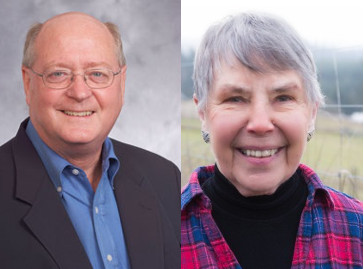Two months from today, voters in Oregon’s second-largest county will decide who will have their fingers on the region’s biggest sprawl button.
Though Washington County, which sits on the western third of the Portland metro area, isn’t facing the rocketing housing demand it once was, its political conversation continues to be dominated by issues of land use, real estate development and transportation — and its five-member board is essentially split 3-2 in favor of expanding urban growth boundaries.
Three of those seats, though, are up for grabs, and a trio of candidates — two challengers, one incumbent — are hoping to tip the county’s balance against suburban expansion. Candidates in two of those races faced off at an event covered by the Oregonian Wednesday night.
County Chair Andy Duyck said that the central question of the campaign is whether the county has enough room in its urban areas to continue developing single-family homes.
He thinks urban boundaries should expand so the county can do so.
“In about 15 to 20 years, there will be no new single-family homes being built in this region,” said Duyck. “There are some people that don’t want you to have a choice. I think that’s what this election is really all about.”
Duyck is facing Allen Amabisca, an Intel employee and neighborhood activist from Helvetia, which would have been affected by a Duyck-backed plan to urbanize that area that was recently scotched by the state Court of Appeals. Here’s a passage from an Amabisica campaign email circulated Thursday:
The other week as I was driving to the office, I saw school children walking to school on the side of the road in a ditch, because there was no sidewalk. At the same time there were thousands of school children in morning rush hour with their parents on their way to school because parents are concerned about the safety of their children when walking to school.
Having good educational outcomes means having students that are safe, well-rested, and focused. When it comes to how we spend your tax dollars, I will prioritize our roads and sidewalks over tax breaks for special interests.

challenger Elizabeth Furse.
(Photos from campaign websites)
Meanwhile, in the race to represent Washington County’s huge western district, including Hillsboro and Forest Grove, former U.S. Congresswoman Elizabeth Furse is carrying a “smart growth” banner against incumbent Bob Terry.
“When I came to Washington County, I loved the fact that you can be in a city and then right away be in the country,” Furse said at Wednesday’s forum. “And that’s what I want to preserve. … Once land is paved over, you can’t farm it.”
Terry, for his part, says on his website that “you are not going to find half the population of Washington County commuting on mass transit and bicycles.”
It’s a theme he hit in his last campaign, in 2010. In fact, Terry doesn’t seem to have updated his campaign website’s policy statement on population growth issues at all in the last four years.
“It in the last 10 years we have grown in population by just over 20%,” his website says, just as it did in 2010. “If current trends continue, we will soon catch and pass Multnomah County.”
But as every American knows, current trends didn’t continue, and Terry’s statistic is no longer accurate: Washington County’s 10-year growth rate is down to 16 percent and falling fast.
Whether Washington County voters have updated their perspective on Terry in the last four years remains to be seen. Ballots will go out May 2, and election day is May 20.


